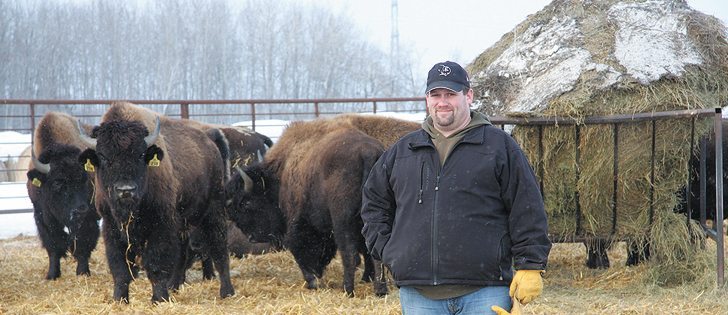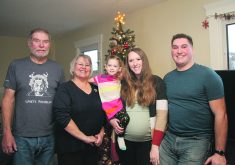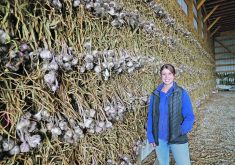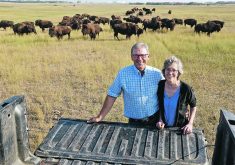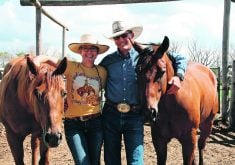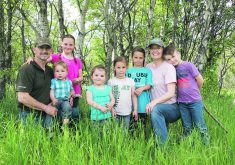NIPAWIN, Sask. — It’s only appropriate that Don and Paulette Scott have a “buffalo room” in their farm home.
Bison-themed photographs, art and awards from nearly 30 years in the industry decorate the walls, while a hide drapes the couch.
And the view through the window is the real thing: hundreds of them.
The couple established Beldon Bison Ranch on 160 acres of sandy land southwest of Nipawin in 1987 when they bought 10 bred cows for $2,500 each.
They bought another 10 a year later.
There were perhaps a half-dozen bison producers in Saskatchewan at that time.
Read Also

Know what costs are involved in keeping crops in the bin
When you’re looking at full bins and rising calf prices, the human reflex is to hold on and hope for more. That’s not a plan. It’s a bet. Storage has a price tag.
“I grew up pulling calves and I knew I didn’t want to do that,” Don said about the decision to give bison a try.
He worked in construction and was away a lot, but those farming and livestock roots still tugged.
“I thought he was crazy,” Paulette said with a laugh.
She also worked off the farm but was never afraid of the big beasts, even though she had to feed them.
“I remember my sister and I would open the gate and Mom would feed the hay and that was it. There was nothing else to do,” said son Nathan, who returned to the ranch with his family five years ago.
Today, Beldon employs two part-time workers to help care for the 400 cows the family owns as well as the others they feed.
The Scotts have survived the roller coaster of prices, producer numbers and markets.
“We’ve seen everything from $10,000 to you couldn’t give them away,” Paulette said of the price fluctuation.
In the beginning it was a breeder and farmgate meat market and a lot of learning as they went along. They attended association meetings in the province, nationally and the United States.
“There was information out there and producers have always been good about helping each other out,” Don said.
The Canadian Bison Association formed in 1982 with an estimated 175 members.
The Saskatchewan Bison Association followed in 1991, with Don as president.
He was a CBA director and holds the distinction of being the first show and sale chair at the Canadian National, which has been held annually during Canadian Western Agribition in Regina since 1993. He has judged at the Gold Trophy show in Denver and did so again this year.
Paulette was SBA secretary and also the first female director on the CBA.
In 1997, the couple received the Myrt Lenton Memorial Award, which recognizes CBA members who give their time and effort to the industry.
“Over time, Dad designed quite a few facilities,” Nathan said. “That’s helped other producers get started. I also wonder how many producers got their first animals from us.”
Many in the industry struggled to survive the early 2000s, and producer numbers dropped significantly during that time.
“It was a correction,” Don said.
“Breeding stock had gotten so high. You can’t keep selling $4,500 heifers and not have a meat market.”
As well, the region suffered through a widespread drought during that time, and the discovery of BSE in a Canadian beef cow also slammed the U.S. border shut for bison.
“If any one of those things had happened it wouldn’t have been bad,” Don said, but the triple whammy was devastating for many.
“The downturn in the industry put a lot of ground or trim on the market,” he said. “It is the driver.”
The family was affected in more ways than one.
Nathan had just bought a truck and was driving for livestock hauler Roberge when the border closed. He changed course and started working in the oil patch.
“We just hunkered down for eight years and survived,” he said.
He and his wife, Amanda, were married on the farm in 2009 and later returned to raise their family.
Don and Paulette were considering a smaller operation at the time. The two generations worked on a plan to enable the younger couple to come into the operation. Amanda also works off the farm at Cumberland College in Nipawin.
Nathan said they had to find the right lender to understand they had a good business plan and could make it work.
Each couple owns their own cows, and the partnership owns the feeders they buy.
Penny, one of Nathan’s two sisters, recently bought some cows, too.
“She’s the picture-taker and the bale hauler,” Nathan said.
Another sister, Sheila, lives with her family in Prince Albert.
Nathan’s three boys, Leyton, 12, Jaxen, 5, and Deon, 2, could be the third generation to operate the ranch. All are interested and helpful, and Deon is quick to tell his father and grandfather if a pen needs bison in it.
“He knows the pen numbers and how old each group is in each pen,” Nathan said.
“He’ll say, ‘fill pen six.’ ”
The Scotts ship most of their slaughter animals to Rocky Mountain Natural Meats in Brush, Colorado.
They say the bison aren’t on a truck much longer than they would be if they were shipped to Alberta. Crossing the border isn’t difficult with the proper paperwork, but it’s important to make sure the crossing is open.
They have a website to promote sales of breeding stock, mainly bulls.
They grow some of their own hay and are fortunate to live in an area where there are a lot of grass seed producers, which make straw available after harvest.
Bison do well on lower quality feed and in the cold weather. The cows spend all winter on pasture.
“I have most of our hay supply out for all winter,” Nathan said in December.
The animals receive minerals and are checked, but otherwise they are left alone.
Feeder animals receive screening pellets or oats.
Nathan is carrying on the family tradition of industry involvement. He is on the SBA board and an initiator of the organization’s Canadian Bull Bison Draft.
It began last year, and Beldon Bison was selected the host ranch. Producers consigned 37 yearling bulls to the draft this year.
They animals are penned together, receive the same feed, health protocol and handling, and weighed periodically.
Two judges will assess them for 10 characteristics by two different judges and a winner will be named. All bulls will go to the SBA’s Premium Stock Show and Sale as two year olds March 4 in North Battleford, Sask.
Nathan said last year’s sale saw the highest average anywhere at $10,500 with a high seller of $20,500.
“It’s a real honour that they trusted us with their best animals,” he said of being the host ranch.


